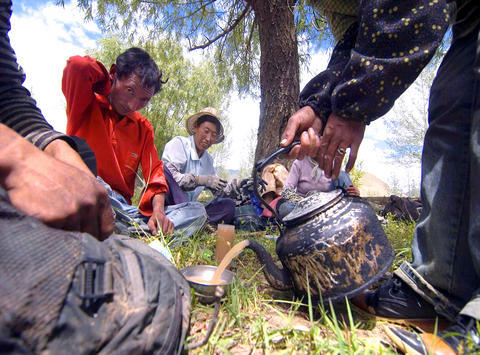The Tzuchi Buddhist group, believing the high-fluorine butter tea which Tibetans have been drinking for centuries is bad for their health, is sending bricks of low-fluorine tea to Tibet, the group said on Tuesday.
The Tzuchi Foundation joined Chinese researchers in studying the tea-drinking habits of Tibetans in 2000, and since 2004, has distributed 144 tonnes of low-fluorine tea to Tibet, the group's deputy leader Wang Tuan-cheng (
For thousands of years, Tibetans have been drinking butter tea to help them digest meat and stay warm in the harsh climate. Tibetan soil has a high fluorine content, which is absorbed by the tea bushes.

PHOTO: EPA/TZUCHI FOUNDATION
Chinese scholars noticed the high levels of fluorine in Tibetan butter tea in 1983 and launched a field study in 1994.
Tzuchi listed fluorine poisoning by tea as the target of one of its overseas relief projects in 2000.
In 2004, Tzuchi and Chinese scholars launched a joint research project which discovered fluorine poisoning from butter tea among minority ethnic groups in Inner Mongolia, Tibet, Sichuan, Qinghai, Gansu and Xinjiang.
According to Tzuchi's study, Tibetans drink large amounts of butter tea, sometimes up to 40 to 50 cups a day.
"They drink it like water, so it causes many health problems, like dental or skeletal fluorosis, yellow teeth, tooth decay and stooping of the back," Tzuchi's Wang said.
A separate study by Chinese doctors showed that 53.5 percent of students in Naqu, northern Tibet, suffer from dental fluorosis because of drinking butter tea from an early age.
According to the WHO, a safe fluorine intake is 2mg for a child and 4mg for an adult, but the fluorine content of a kettle of butter tea made from the traditional Tibetan brick-tea is around 6mg to 10mg.
The fluorine content in the low-fluorine tea brick is less than 4mg.
Cao Xing (
But Tzuchi hopes Cao can pass the patent on to Chinese health authorities so that they can mass produce low-fluorine tea bricks for Tibetans and other Chinese ethnic minorities.

A magnitude 6.4 earthquake struck off the coast of Hualien County in eastern Taiwan at 7pm yesterday, the Central Weather Administration (CWA) said. The epicenter of the temblor was at sea, about 69.9km south of Hualien County Hall, at a depth of 30.9km, it said. There were no immediate reports of damage resulting from the quake. The earthquake’s intensity, which gauges the actual effect of a temblor, was highest in Taitung County’s Changbin Township (長濱), where it measured 5 on Taiwan’s seven-tier intensity scale. The quake also measured an intensity of 4 in Hualien, Nantou, Chiayi, Yunlin, Changhua and Miaoli counties, as well as

Credit departments of farmers’ and fishers’ associations blocked a total of more than NT$180 million (US$6.01 million) from being lost to scams last year, National Police Agency (NPA) data showed. The Agricultural Finance Agency (AFA) said last week that staff of farmers’ and fishers’ associations’ credit departments are required to implement fraud prevention measures when they serve clients at the counter. They would ask clients about personal financial management activities whenever they suspect there might be a fraud situation, and would immediately report the incident to local authorities, which would send police officers to the site to help, it said. NPA data showed

ENERGY RESILIENCE: Although Alaska is open for investments, Taiwan is sourcing its gas from the Middle East, and the sea routes carry risks, Ho Cheng-hui said US government officials’ high-profile reception of a Taiwanese representative at the Alaska Sustainable Energy Conference indicated the emergence of an Indo-Pacific energy resilience alliance, an academic said. Presidential Office Secretary-General Pan Men-an (潘孟安) attended the conference in Alaska on Thursday last week at the invitation of the US government. Pan visited oil and gas facilities with senior US officials, including US Secretary of the Interior Doug Burgum, US Secretary of Energy Chris Wright, Alaska Governor Mike Dunleavy and US Senator Daniel Sullivan. Pan attending the conference on behalf of President William Lai (賴清德) shows a significant elevation in diplomatic representation,

The Taipei City Reserve Command yesterday initiated its first-ever 14-day recall of some of the city’s civilian service reservists, who are to undergo additional training on top of refresher courses. The command said that it rented sites in Neihu District (內湖), including the Taipei Tennis Center, for the duration of the camp to optimize tactical positioning and accommodate the size of the battalion of reservists. A battalion is made up of four companies of more than 200 reservists each, it said. Aside from shooting drills at a range in New Taipei City’s Linkou District (林口), the remainder of the training would be at